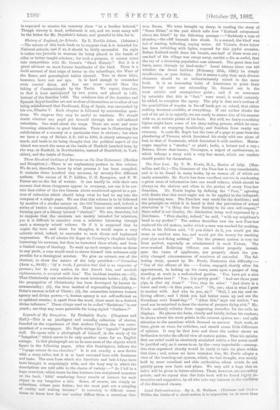Three Hundred Outlines of Sermons on the New Testament. (Hodder
and Stoughton.)—There is no explanatory preface to this volume. We do not, therefore, know by what process it has been compiled. It contains three hundred tiny sermons, by seventy-five different authors, The names of H. P. Liadon, C. H. Spurgeon, and F. W. Farrar are on the list of writers, it can hardly be with their own consent that these clergymen appear in company, nor can it be cer- tain that either of the two Canons above mentioned agreed to a pro cess of reduction which should bring what he had to say into the compass of a single page. We see that this volume is to be followed by another of a similar nature on the Old Testament, and, indeed, a series of twelve is contemplated. These issues are announced as forming part of a library termed "clerical." We are, therefore, led to suppose that the contents are mainly intended for ministers, yet it is difficult to conceive even a minister labouring through such a strangely mixed volume. Or if it is supposed that he might dip here and there for thoughts, it would argue a very eclectic mind, indeed, to surrender to such divers and haphazard impressions. We all admire Sir Roger do Coverley's chaplain boldly borrowing his sermons, but then he borrowed them whole, and from a limited range of theology. To work up such meagre notes as these to any profit, a man would need to throw himself into extremes only possible for a theological acrobat. We give an extract, one of the shortest, to show the nature of the help provided :—" Cornelius (Acts x., 31-35) : Of a truth, I perceive that God is no respecter of persons ; but in every nation, he that feareth hint, and worlceth righteousness, is accepted with hint.' The incident teaches us,—(1), That Christianity can eradicate the most inveterate habits ; (2), that the propagation of Christianity has been developed by human in- strutnentality ; (3), the true method of expounding Christianity,— Peter's sermon is full of Christ ; (4), the connection between human agency and divine power,-1, human agency is not self-sufficient as to spiritual results; 2, apart from the word, there must be a distinct divine influence." Those things used to be celled" Skeletons," in our youth; are they any more palatable for being styled "Outlines ?"


































 Previous page
Previous page